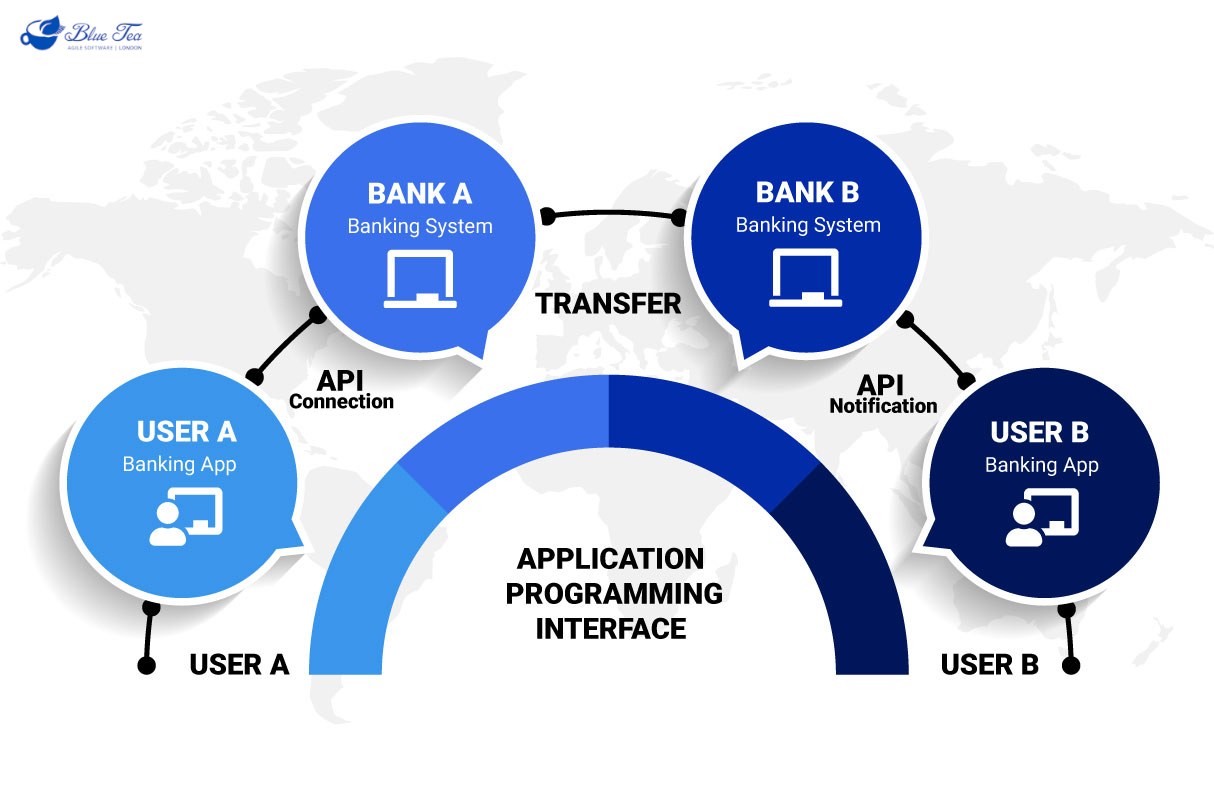An Application Programming Interface, commonly known as API, is a technical software concept. It allows different types of software applications to communicate with each other and often present results to a user that come from various systems, combined.
When a user ‘requests’ something via an application, one or more APIs will usually exchange information with other software platforms that can deliver on the user’s request.
An example would be payment via bank transaction from a User’s banking App. The mobile App would connect to User A’s banking systems via API, Bank A would connect to Bank B to execute the transfer, then usually Bank B would send a notification to User B’s banking App (and push notifications themselves, are essentially API calls).
In a more complex example, suppose you plan your next vacation. Imagine you browse the website for a holiday booking agency. You type in some important information – your origin, location, stay time, room type and hotel requirements. By doing so, you expect that the booking site will show you relevant deals that you can sort. For example, by price, origin airport, or otherwise. To do so, multiple APIs will perform hundreds of requests (also known as “API calls”) concurrently to “speak” to other entities such as agents, airlines, and hotel groups to name a few. All for the purpose of identifying the best match for your requirements.
The “request” made by the booking website, provides a short timeframe for the other end (also known as an “API endpoint”) to reply with results that the booking website’s API “understands”. These two systems need to speak the same language you see, and that’s very important. Assuming all goes well, the booking website you used presents you with any results.
Why are APIs important?
Application Programming Interfaces have changed the way companies build their products and offer services. With APIs, businesses add more value and flexibility for their customers. They manage to achieve this without delving into developing these functions from the ground up. The benefits to users are quite obvious.
Also, APIs also bring tons of benefits to developers. They also enhance security.
APIs are important for developers
The adoption of APIs in the IT world marks a massive change for the entire software industry. With APIs, devs can write less code and get the data they need from external sources.
IT specialists no longer are required to write millions of lines of spaghetti code that are hard to manage, update and maintain, for the sole purpose of allowing systems to communicate with each other. This is where “common APIs” come into play. Common APIs standardise communication between systems that are looking to exchange certain types of information, such as flights, weather, or financial data.
Developers no longer need to worry about how two systems will communicate with one another securely, or how and what data might need exchanging; they can rely on documented APIs (through what’s called “API documentation”) to rapidly develop a required “API integration” resulting in higher quality software products that are less prone to errors due to communication with other systems. This also enables the development community to focus on more important tasks, and ultimately innovate for their clients and employers.
The Application Programming Interface is important for businesses
To stay competitive in today’s digital world, brands massively adopt APIs. As consumers become more and more dependent on mobile devices, wearables and IoT, businesses are required to search for new ways of delivering new services.
Smaller businesses as well as larger enterprises are realising the vast revenue potential of APIs and are deciding to benefit from using such systems more and more.
Overall reasons for the adoption of APIs:
- Communication. Exchange of information between systems which would otherwise be very complex or impossible.
- Resource efficiency. Brands that adopt APIs save time and engineering hours that would otherwise be put in building complex codes with similar or worse functionality.
- Innovation and improvement. By using APIs companies can focus on expanding and improving their business prospects.
- Easier maintenance. There are dedicated teams that know exactly how to fix technical errors and improve the performance of systems that utilise APIs.
Searching for custom APIs for your new or existing systems, or support of your complex Back-End? Check out our services and let us help you innovate rapidly, putting you ahead of your competition!




